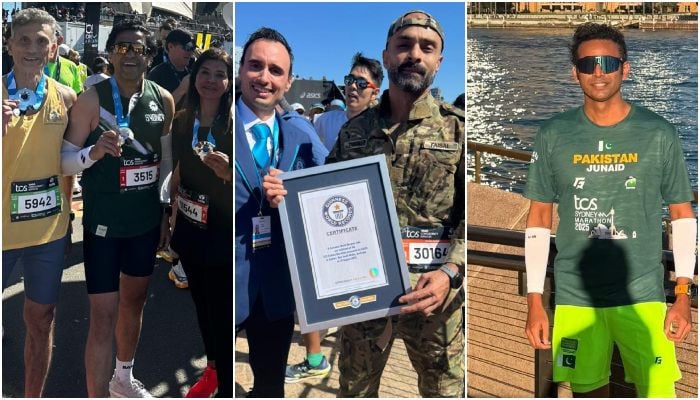 |
| A collage showing Pakistani runners at Sydney Marathon. — Reporter/Instagram@muhammad.junaidd |
Faisal Shafi Creates History with Guinness World Record at Sydney Marathon
Pakistani Runner Faisal Shafi Sets Guinness World Record at Sydney Marathon 2025Faisal Shafi makes history at the Sydney Marathon 2025, becoming the first Pakistani runner to claim a Guinness World Record. His achievement inspires athletes across Pakistan.
A collage showing Pakistani runners at Sydney Marathon. — Reporter/Instagram@muhammad.junaiddKARACHI: Pakistani runners showcased impressive performances at the Sydney Marathon on Sunday, marking the event's first edition since its elevation to Abbott World Marathon Major status, with Faisal...
Pakistani long-distance runner Faisal Shafi has etched his name into the history books by securing a Guinness World Record at the Sydney Marathon, bringing pride and recognition to Pakistan on a global stage. Known for his relentless passion and discipline, Shafi’s latest achievement is not only a personal triumph but also an inspiration for athletes back home who dream of representing their country in international sporting events.
Shafi competed in the Sydney Marathon 2025, one of the most prestigious races in the world, attracting thousands of professional runners, fitness enthusiasts, and record challengers. What set Shafi apart this year was his determination to push beyond the limits of endurance. His remarkable feat was officially verified and entered into the Guinness World Records, cementing his place among elite athletes who achieve extraordinary milestones in marathon running.
For Pakistan, a country still developing its athletics infrastructure, Shafi’s record resonates beyond the finish line. His success proves that with resilience, talent, and international exposure, Pakistani athletes can compete with the best in the world. At a time when cricket dominates headlines, Shafi’s story shines a light on the potential of track and field sports, sparking hope for greater investment and recognition for runners.
Speaking after his achievement, Shafi expressed gratitude for the unwavering support of his family, trainers, and community. He described the record-breaking moment as surreal, noting that years of disciplined training, diet management, and mental preparation all came together on race day. “It wasn’t just about crossing the finish line,” he said, “it was about proving that Pakistani runners can dream big and achieve bigger.”
The Sydney Marathon itself has become a symbolic race for athletes who want to test their endurance on a world-class stage. With its scenic yet challenging route across Sydney’s iconic landmarks, the marathon demands not just physical strength but also psychological grit. For Shafi, every kilometer was a reminder of the sacrifices he made, from long early morning training runs to battling self-doubt. His record adds to the growing prestige of the marathon, which often sees runners aiming to combine personal milestones with historic achievements.
What makes Shafi’s accomplishment even more remarkable is its timing. Pakistan’s athletics community is in the middle of a slow yet steady rise, with more athletes venturing abroad to compete. Shafi’s Guinness World Record could serve as a turning point, inspiring young runners across Pakistan to pursue marathon running as a serious career path. His journey also underlines the importance of global platforms like Guinness World Records in validating and celebrating such milestones.
Sports analysts believe Shafi’s achievement is a call to action for Pakistan’s sports authorities. Investment in coaching, facilities, and international training opportunities could allow the country to nurture more champions in athletics. For now, however, the spotlight is firmly on Faisal Shafi, whose dedication has given Pakistan a reason to celebrate on the international sports map.
From the streets of Pakistan to the marathon roads of Sydney, Shafi’s story is a powerful reminder of what happens when passion meets perseverance. His Guinness World Record is not just a statistic but a symbol of breaking barriers, chasing dreams, and making history. For aspiring athletes back home, Faisal Shafi has proved that the world is not too far to conquer.
n match. What began as a heated post-match handshake turned into a public apology when Ostapenko accused the American of having “no class” and “no education” for failing to apologize after winning a point via a net cord—an unwritten but respected tennis courtesy.
Townsend, visibly taken aback during her on-court post-match interview, noted that Ostapenko’s choice of words carried potential racial undertones—compounding the scrutiny, especially given Townsend’s identity as a Black player. Naomi Osaka weighed in as well, calling Ostapenko’s words “the worst things you can say to a Black player in a majority-white sport,” pushing the controversy into the spotlight.
A Public Apology and a Cultural Learning Moment
Three days later, Ostapenko took to Instagram to apologize. She clarified that English isn’t her first language and that her use of “education” was meant to reference tennis etiquette—not personal intelligence or background. She explicitly acknowledged that her phrasing could offend—and pledged to learn and grow from the incident.Townsend responded to the apology with grace, stating, “That’s nice... that’s cool.” But she also shared a broader perspective—emphasizing that the moment served as a lesson for Ostapenko: you can’t expect people to react the way you want, and it’s better to focus on your own game.
The Broader Implications
The incident has sparked a larger conversation about sportsmanship, language, and respect in tennis. While the post-match handshake isn’t codified in rulebooks, it reflects a deeper tradition within the sport—one that transcends technicalities to embody dignity and mutual recognition. Moments like this highlight how a simple gesture or word can resonate far beyond the court.For Townsend, the exchange amplified her platform in a valuable way. She fired back in the next round with poise and focus—defeating the No. 5 seed Mirra Andreeva. Her composure spelled a shift: beyond tennis, she became a symbol of resilience and authenticity.
Meanwhile, Ostapenko’s apology reflects a rare and human response under pressure: owning a mistake, clarifying intent, and offering an olive branch—three steps not always easy in the competitive, high-stakes world of professional sports.
Tags
Sports
